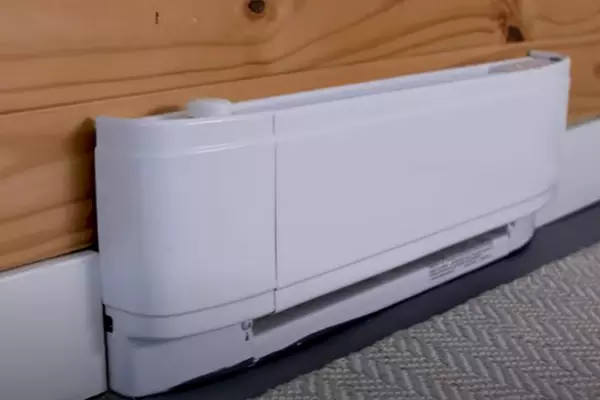Baseboard heaters have become a popular choice for home heating solutions, noted for their efficiency and ease of installation. They come in two main variants: electric and hot water. Both have their unique merits, but today we will focus on the latter.
Hot water baseboard heaters are admired for their ability to provide consistent heat. They operate by channeling hot water through pipes within a baseboard radiator, dispersing warmth into your living space. These heaters are known for their silent operation and efficient heat distribution.
Yet, safety remains a significant concern for any heating appliance. As you assess the safety of hot water baseboard heaters, it is vital to consider their unique attributes, the precautions needed, and the overall safety measures for such devices.
Contents
Hot Water Baseboard Heaters
Working Principle of Hot Water Baseboard Heaters
Hot water baseboard heaters use heated water circulated through a system of pipes. This heated water emanates warmth into the room, heating the space effectively. The efficient heat distribution can save you a considerable amount on your energy bills.
Pros and Cons of Hot Water Baseboard Heaters
Like any heating solution, hot water baseboard heaters have their strengths and weaknesses. On the positive side, they provide a consistent heat source and can be easily controlled room-by-room. On the downside, they can take up wall space and need more time to heat up compared to other types of heaters.

Assessing Safety: Hot Water Baseboard Heaters
The safety of any heating system, including hot water baseboard heaters, should be a top priority. Here, we take an in-depth look at the safety aspects unique to these heaters, and the precautions you can take to ensure they function optimally and safely.
General Safety Measures for Any Heaters
Regardless of the type, every heating system should be handled with care. Here are some general safety guidelines:
- Placement: Position your heater in a secure, level area where it can’t be easily knocked over.
- Distance from Flammable Materials: Keep the heater away from furniture, curtains, bedding, and other flammable materials.
- Supervision: Never leave a heater unattended when in use, especially around children and pets.
- Overloading: Don’t overload your electrical outlets or use an extension cord to power your heater.
- Signs of Damage: Regularly inspect your heater for any signs of damage, such as frayed wires or corrosion.
Specific Safety Tips for Hot Water Baseboard Heaters
Hot water baseboard heaters, although safe, have specific safety precautions that owners should take into account. These include:
- Installation: It is recommended to have a professional install your heater. Incorrect installation can lead to leaks or inefficient heating.
- Placement: These heaters should be installed along the baseboard of your wall, away from high traffic areas. Be sure to maintain a safe distance from furniture and other items to allow for proper heat distribution.
- Cleaning: Regularly clean the heater to avoid dust and dirt accumulation, which can impair the heater’s efficiency and become a potential fire hazard.
- Maintenance: Regular professional maintenance is key. Technicians can identify and fix issues before they become significant problems.

Fire Risk Evaluation with Hot Water Baseboard Heaters
Fire risk is a common concern with heating appliances. However, hot water baseboard heaters are generally safer than their electric counterparts. Since they utilize hot water to heat your space, the risk of a fire starting directly from the appliance is considerably reduced.
Nevertheless, these heaters do produce substantial heat that could potentially ignite nearby flammable materials. As such, careful placement and appropriate distance from combustible items are crucial. Never allow draperies, furniture, or other flammable items to obstruct or come in close contact with the heater.
Regular maintenance and cleaning can also significantly reduce the risk of fire. Over time, dust and dirt can accumulate inside the heater, and when heated, this could potentially ignite. Regular cleaning ensures that your heater stays efficient and reduces any fire risk.
Precautions Around Hot Water Baseboard Heaters
Once you’ve evaluated the fire risk and know the safety measures for heaters, it’s important to take precautions specifically for hot water baseboard heaters. These include placement, how to avoid potential hazards, and safety measures for children and pets.
Suitable Placement for Baseboard Heaters
Proper placement of your hot water baseboard heater can enhance its efficiency and safety. Consider these tips when deciding where to install your heater:
- Install your heater in areas that require heat the most.
- Ensure the heater is placed against exterior walls under windows, if possible, for better heat distribution.
- Do not install your heater behind furniture or drapes. These can block the heat and create a fire hazard.
Avoiding Heater Hazards: Furniture and Flammable Materials
Placing furniture or flammable materials too close to your heater can present a potential fire hazard. Follow these guidelines to prevent such risks:
- Keep all furniture and flammable materials at least 12 inches away from your heater.
- Do not place any objects on top of your heater.
- Avoid using your heater as a drying rack for clothes or other items.
Children and Pet Safety Measures
Children and pets are often unaware of the dangers a hot heater can pose. To keep them safe:
- Educate children about the potential hazards of heaters.
- Install a sturdy cover over your heater to prevent children and pets from accidentally touching it.
- Consider placing barriers or gates around your heater to prevent pets from getting too close.

Maintenance Guide for Hot Water Baseboard Heaters
Regular Cleaning: A Must
Regular cleaning is critical to ensure the heater functions optimally. Dust and debris can accumulate inside the baseboard heater, causing it to work harder and possibly creating a fire hazard.
Proper Inspection and Servicing
It’s important to get your heater inspected and serviced by a professional at least once a year. They can detect any potential issues early and ensure the heater is operating safely and efficiently.
Fixing Damaged Parts Promptly
Any damaged parts should be fixed promptly to prevent further damage and potential safety issues. This includes any leaks in the piping system or issues with the boiler that heats the water.
Safety Features to Look For When Purchasing
Built-in Safety Devices
Look for heaters that come with built-in safety features like overheat protection, which turns off the heater if it gets too hot.
Compliance with Safety Standards
Ensure the heater complies with safety standards set by recognized bodies like Underwriters Laboratories (UL) or Canadian Standards Association (CSA).
Energy Efficiency and Heat Control
Energy-efficient heaters with adjustable heat controls can provide safety and save on energy costs.
Are Hot Water Baseboard Heaters Right for You?
Factors to Consider: Cost, Safety, Efficiency
Before deciding on a hot water baseboard heater, consider its cost, safety features, and efficiency. These heaters are generally safe, but it’s important to use and maintain them properly.
Comparing with Other Heating Systems
Compare hot water baseboard heaters with other heating systems. This includes comparing the safety features, cost, and heating efficiency of each system.
Frequently Asked Questions
How safe are hot water baseboard heaters?
Hot water baseboard heaters are generally safe, but like any heating system, they require proper use and maintenance. Ensure they are installed correctly, kept clean, and regularly serviced.
What safety features should I look for when buying a hot water baseboard heater?
Look for heaters with built-in safety features like overheat protection. Also, make sure the heater complies with recognized safety standards.
How often should hot water baseboard heaters be serviced?
It’s recommended to have your hot water baseboard heaters serviced at least once a year. Regular servicing can detect potential issues early and ensure the heater is operating safely and efficiently.
Conclusion
Hot water baseboard heaters are a viable heating option for many homes. They offer efficiency and a comfortable, consistent heat source. However, like all heating solutions, they require proper use and maintenance to ensure safety.
Safety measures should always be taken seriously when dealing with any heating system. With hot water baseboard heaters, it is crucial to adhere to safety guidelines and ensure regular maintenance.
In the end, the decision rests on balancing your comfort needs with safety considerations. A hot water baseboard heater could very well be the right choice for you, provided you are willing to follow the necessary precautions and care.

